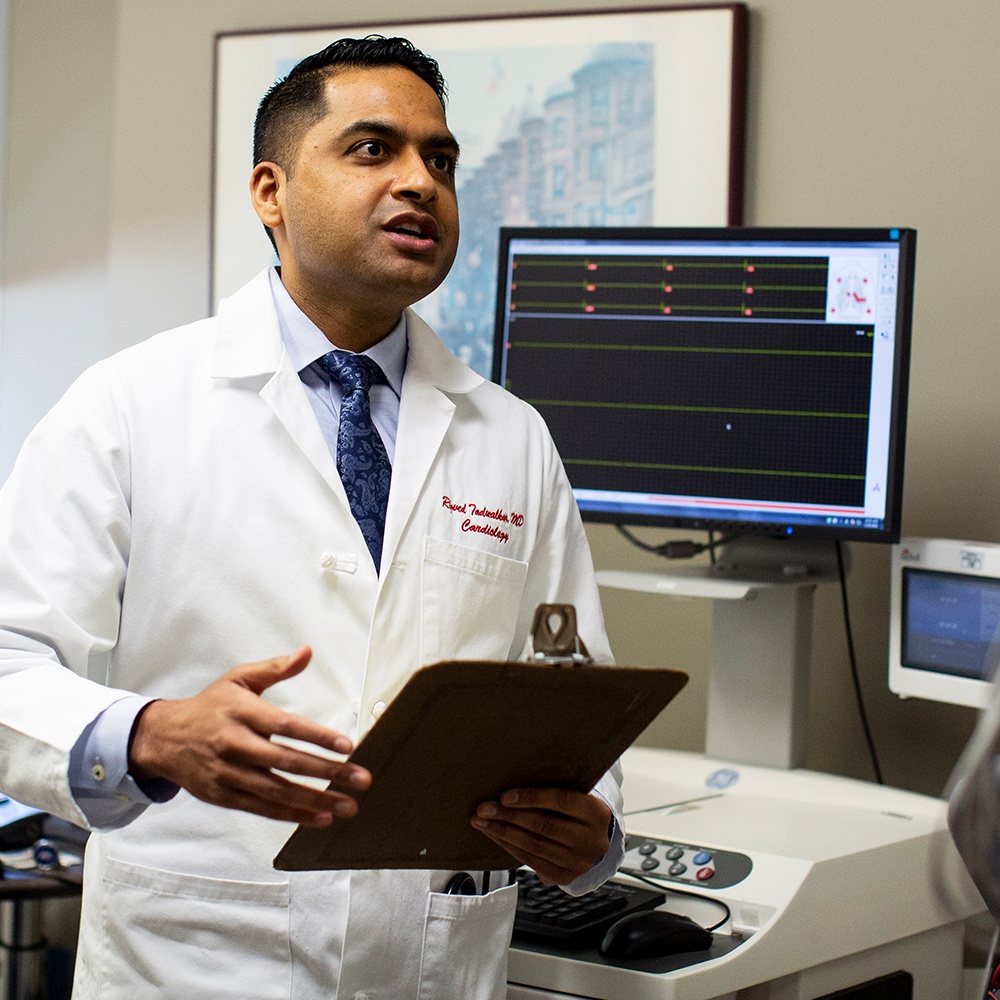Cardiac Electrophysiology Study

Overview
What is a Cardiac Electrophysiology Study?
A cardiac electrophysiology study (EPS) is a test used to evaluate and map your heart’s electrical system. EPS may be recommended to help your doctor find the cause of your abnormal heart rhythm (arrhythmia) and to determine the most effective treatment for your condition. During the test, your doctor will safely send electrical signals to your heart to record the effect and may give you different medicines to see which one works best. EPS is also used to determine which implantable device, such as a pacemaker or an implantable cardioverter defibrillator, may be best for your condition or if you need a cardiac ablation, a procedure that scars tissue in your heart that triggers arrhythmia.
Why
Why Cardiac Electrophysiology Study is Done
A cardiac electrophysiology study may be recommended for several reasons, including:
- If you’re at risk of sudden cardiac arrest or death.
- If you’ve been diagnosed with arrhythmia.
- If you’ve experienced temporary loss of consciousness.
- If you’re going to have heart surgery, such as a cardiac ablation.
- To develop an effective treatment plan for your condition.

Risks
Cardiac Electrophysiology Study Potential Risks and Complications
An EPS generally doesn’t hurt, but you may feel uncomfortable when your doctor adjusts the electrical signals to your heart. The risk of complications from EPS may include:
- Bleeding or infection at the catheter insertion site.
- Damage to your blood vessels.
- Damage to your heart valves.
- Blood clots.
- Puncture to your heart.
- Stroke.
- Heart attack.
Your doctor will discuss the benefits and risks of this procedure so you can make an informed decision.

Prep
Preparing for a Cardiac Electrophysiology Study
Your doctor will give you specific instructions to prepare for an EPS that may include:
Medications
Discuss your medications and if you have any implanted heart devices
Food & Drink
Stop eating and drinking the night before the test
What to Expect
What to Expect During a Cardiac Electrophysiology Study
During the Procedure
Before the procedure, you’ll have an intravenous line inserted in your arm or hand and given a sedative to help you relax. Then the area in your groin where the catheters will be inserted will be numbed and your doctor will thread the catheters to several places in your heart. You may have dye injected into the catheter so your blood vessels and heart can be clearly visible using X-ray imaging. The catheters have electrodes that are used to send electrical signals to your heart to create arrhythmia and to see how your heart responds. Medicines that correct arrhythmia may be inserted to see which one works best. Your doctor may proceed with a cardiac ablation during the procedure if indicated. A typical EPS last one to 4 or more hours, depending on results and if you’re having an ablation procedure
After the Procedure
After the procedure you’ll be in the recovery area to rest for several hours where you’ll be monitored and to prevent bleeding from the catheter insertion site.
- You may be sent home on the same day so plan on having someone drive your home.
- You should rest for the rest of the day.
- You’ll probably be sore for a few days after an EPS.
- Your doctor will give further instructions for home care.
- Be sure to call your doctor immediately if:
- You notice unusual swelling or fluids leaking from the catheter insertion site.
- You have bleeding that does not stop with pressure.
- Your hands and feet feel numb or very cold.
- Your puncture site looks more and more bruised.
Specialists